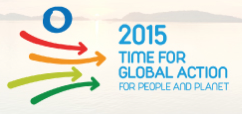 2 August 2015: The 2030 Agenda for Sustainable Development, which was adopted at the conclusion of the post-2015 development agenda negotiations on 2 August 2015, contains five sections, including the 17 Sustainable Development Goals (SDGs) and 169 targets proposed by the Open Working Group (OWG) in 2014, with several revisions for specificity and consistency with international ambition. The document for consideration by the 69th UN General Assembly (UNGA) is expected to be finalized and made available ahead of the UN summit for the adoption of the agenda, which will take place from 25-27 September 2015.
2 August 2015: The 2030 Agenda for Sustainable Development, which was adopted at the conclusion of the post-2015 development agenda negotiations on 2 August 2015, contains five sections, including the 17 Sustainable Development Goals (SDGs) and 169 targets proposed by the Open Working Group (OWG) in 2014, with several revisions for specificity and consistency with international ambition. The document for consideration by the 69th UN General Assembly (UNGA) is expected to be finalized and made available ahead of the UN summit for the adoption of the agenda, which will take place from 25-27 September 2015.
The preamble of the text announces a “plan of action for people, planet and prosperity.” It highlights strengthening “universal peace in larger freedom,” and recognizes that eradicating poverty in all its forms and dimensions, including extreme poverty, is the greatest global challenge and an indispensable requirement for sustainable development. It indicates the universal and collaborative nature of the agenda, and pledges that no one will be left behind. On the five P’s, it says that the SDGs and targets will stimulate action in the following areas of critical importance for humanity and the planet: People, Planet, Prosperity, Peace and Partnership.
The declaration contains 53 paragraphs, divided into eight sections, and describes “our vision” – a world free of fear and want, including universal literacy and equitable and universal access to quality education, health care and social protection, and assurance of physical, mental and social wellbeing. It recommits to the full realization of the Millennium Development Goals (MDGs) while setting out objectives beyond them, introduces the SDGs and their targets, and highlights the need for a revitalized Global Partnership and other forms of Means of Implementation (MOI). On follow-up and review of the agenda, the declaration says the High-level Political Forum on Sustainable Development (HLPF) will have the central role at the global level.
The SDGs and targets are largely unchanged from those proposed by the OWG in July 2014, although they incorporate several “technical revisions,” in targets under Goals 2 (hunger), 3 (health), 4 (education), 6 (water and sanitation), 7 (energy), 8 (economic growth and employment), 9 (infrastructure), 11 (cities), 14 (oceans and seas), 15 (territorial ecosystems), and 17 (MOI).
The chapter on MOI specifies the relationship between the Addis Ababa Action Agenda (AAAA) and the post-2015 development agenda, saying the post-2015 agenda and SDGs “can be met within the framework of a revitalized global partnership for sustainable development, supported by the concrete policies and actions outlined in the Addis Ababa Action Agenda, which is an integral part” of the post-2015 agenda. It adds that the AAAA “supports, complements and helps contextualize the 2030 Agenda’s means of implementation and targets.” It also reproduces paragraph 123 of the AAAA on establishing the Technology Facilitation Mechanism (TFM).
The fourth chapter outlines the framework for follow-up and review at national, regional and global levels. It notes that a set of global indicators for the SDGs and targets will be developed by the Inter-agency and Expert Group on SDG Indicators (IAEG-SDGs) by March 2016, agreed by the UN Statistical Commission and adopted thereafter by ECOSOC and the UNGA, to be complemented by indicators and regional and national levels developed by Member States. It also commits to supporting developing countries, particularly African countries, LDCs, SIDS and LLDCs, in strengthening the capacity of national statistical offices and data systems. The global section also indicates roles for an annual SDG Progress Report and the Global Sustainable Development Report, thematic reviews at the HLPF, and says the follow-up and review for the AAAA – including through the annual ECOSOC Forum on FfD – will be integrated with the follow-up and review of the post-2015 development agenda in the HLPF.
Last-minute negotiations, before the document could be adopted by the informal negotiation process, pertained to, inter alia: placement of a reference to SIDS in target 13.b on climate change planning and management; whether the term “colonial” should be included with a reference to foreign occupation; whether to refer to “people” or “peoples” under occupation in relation to the right of self-determination; whether to “promote” or “ensure” benefit sharing from genetic resources, in targets 2.5 and 15.6; and debt sustainability.
After several statements by large groups and individual Member States, Co-Facilitators Macharia Kamau (Kenya) and David Donoghue (Ireland) declared the document officially adopted. Susana Malcorra, Chef de Cabinet of the UN Secretary-General, outlined the complexity of the agenda and its implementation challenges, adding that the UN, Member States, regional organizations, the private sector, NGOs and everybody else will have to contribute, noting that “the UN cannot do this alone.” She conveyed the UN Secretary-General’s thanks for the achievement of this second milestone ahead of the 70th anniversary of the UN.
The Earth Negotiations Bulletin summary and brief analysis of the final, two-week negotiation session and outcome document are now available. [Website for Post-2015 Negotiation Process] [IISD RS Meeting Coverage] [Transforming our world: the 2030 Agenda for Sustainable Development] [IISD RS Story on Closing Negotiation Session]